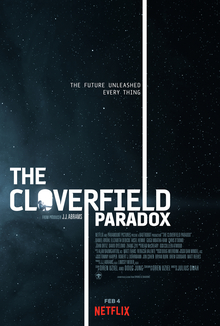Netflix caused quite the frenzy earlier this week when they unveiled a teaser for The Cloverfield Paradox, a long-delayed title they acquired from Paramount a few weeks ago, during the Super Bowl then made it available to watch immediately following the conclusion of the game. This aggressive marketing tactic allowed the streaming giant to provide near-instant gratification to its subscribers in an age that pretty much demands it while also continuing the mystique that has surrounded the Cloverfield universe since its inception a decade ago. In a not particularly shocking development, the inventive release rollout is one of the only noteworthy things about this clusterfuck of a semi-sequel.
The Cloverfield Paradox plays out like a feature-length sci-fi grab bag. You want a space station setting? You got it. Some parallel universe talk? No problem. A little bit of Alien-inspired body horror? BAM! Strange plot twists? Done deal. How about some clarification on the franchise's previously unanswered questions as a cherry on top of this sloppy intergalactic sundae? Sounds divine. This overwhelming collection of moving parts makes for a viewing experience that is relatively entertaining at times, but is often insane, puzzling and flat-out dumb. If nothing else, this pile of manic space gobbledygook made me develop a deeper appreciation for the tense, straightforward storytelling of the other Cloverfield films.
A popular theory as to why this film failed to hit its intended target is due to its limited connections to Cloverfield, which is a take that I don't agree with at all. 10 Cloverfield Lane featured even fewer connections to the 2008 original yet still managed to be a brilliantly-executed thriller. The Cloverfield Paradox's issue is that unlike its predecessors, it largely lacks tension or intrigue. It's a lot harder to get invested in a mysterious sc-fi tale when the stakes hardly escalate and the director fails to mine any intensity out of a claustrophobic setting. Outside of a few cool, interesting explanations to events from prior films, The Cloverfield Paradox adds nothing to the cannon and I can't really fault Paramount for wanting to get this middling piece of fan service off their books.
Grade: C+
The Cloverfield Paradox plays out like a feature-length sci-fi grab bag. You want a space station setting? You got it. Some parallel universe talk? No problem. A little bit of Alien-inspired body horror? BAM! Strange plot twists? Done deal. How about some clarification on the franchise's previously unanswered questions as a cherry on top of this sloppy intergalactic sundae? Sounds divine. This overwhelming collection of moving parts makes for a viewing experience that is relatively entertaining at times, but is often insane, puzzling and flat-out dumb. If nothing else, this pile of manic space gobbledygook made me develop a deeper appreciation for the tense, straightforward storytelling of the other Cloverfield films.
A popular theory as to why this film failed to hit its intended target is due to its limited connections to Cloverfield, which is a take that I don't agree with at all. 10 Cloverfield Lane featured even fewer connections to the 2008 original yet still managed to be a brilliantly-executed thriller. The Cloverfield Paradox's issue is that unlike its predecessors, it largely lacks tension or intrigue. It's a lot harder to get invested in a mysterious sc-fi tale when the stakes hardly escalate and the director fails to mine any intensity out of a claustrophobic setting. Outside of a few cool, interesting explanations to events from prior films, The Cloverfield Paradox adds nothing to the cannon and I can't really fault Paramount for wanting to get this middling piece of fan service off their books.
Grade: C+

No comments:
Post a Comment